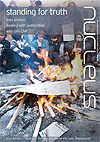Laurence Crutchlow considers recent tuition fee protests and our response.
November 2011 saw another protest in London over university tuition fees. (1) Although there were 24 arrests, the event was more peaceful than past protests. Organisers and police varied in their estimates of attendance, with police claiming that about 2,000 students had attended, but organisers claiming a figure of 15,000. Much stricter policing may well have contributed to the relatively small number of arrests, and might also have put off some from attending the protest.
UK tuition fees, currently set at £3,000 per year, are set to rise sharply for students starting university courses next year, with a maximum level of £9,000 per year. For the majority of students studying a first degree, it will be possible to borrow money at index-linked rates to cover these costs. Different policies in Scotland, Wales and Northern Ireland mean that there will be variations for students in different parts of the UK, with English students generally worst affected. How is a Christian medical student to respond to a protest like this? Should we take part and encourage others to do so? Should we protest, but using other means? Should Christians be supporting protests against increased fees at all? Is there a position on fees that all Christians should take, or is it an issue where we may expect to differ?
The answers may well be matters of wisdom, rather than of direct command from God. Not all will draw the same conclusions, so there will be Christians on both sides of this debate. Nonetheless, we should ensure that we've thought through more 'political' issues like fees. We are just as likely to discuss fee rises with a colleague as more obviously 'Christian' questions of ethics, and should be ready to give an answer that is clear, and invites discussion about the basis for our beliefs. Let's consider a few common questions raised over fees and protests from a Christian perspective, some of which will apply to other issues as well. By doing this I hope that we will be better prepared to give a thought-through response.
respecting authorities – can we protest at all?
Paul tells the Romans to 'Let everyone be subject to the governing authorities' (ESV). (2) Does this mean that we simply abide by a policy we believe to be wrong without protest? The answer is almost certainly 'no'. The Romans had no choice about their government. Although some could elect to a senate, it had little real power when Paul wrote. (3) But in the UK we have considerable say in our government. Not only can we vote out a government we do not support, we can also lobby our MP over important issues. Really being subject to the governing authorities includes taking part in the political process, as we see Joseph, Daniel, Esther and Nehemiah doing in Scripture. (4) Indeed, Isaiah's condemnation of unjust law in Israel (5) suggests that those who make law bear responsibility for it. Living in a democracy, we bear some of that responsibility, whether or not we engage in the law-making process. Peaceful protest is a legitimate part of the democratic process in the UK. If we are strongly opposed to increased fees, I think it quite reasonable to join in peaceful protest.
what about 'fairness'?
There was much political talk of 'fairness' during the 2010 election campaign. 'It is just not fair, education should be available to everyone', said one of the marchers. (6) Exactly what 'fairness' means isn't always clear. It can often be self-centred. Though rising fees may not seem fair from our own perspective, we should be able to see others' perspectives as Christians. Have we considered the perspective of someone who will never go to university, but has to fund others' university education through tax?
Will the increased debts caused by fees narrow the social spectrum from which medical students are drawn? The BMA has noted a small drop in applications to medical school from lower income homes already, and believes that this is linked to higher debt levels. (7) Some would see this as unfair, but others might argue that fee arrangements are the same for all, with families on lower incomes already getting extra help.
A wider perspective should lead us to consider what happens overseas. High fees for university study are commonplace in much of the world. The Association of American Medical Colleges reports a range of annual fees for medical school from $13,529 (£8,562) to $43,815 (£27,384) in public universities, with the limit rising to $57,962 (£36,685) in private universities. (8) UK students are not the only ones expected to pay. Australian students make a substantial contribution towards their fees as well, and of course many international students studying in the UK pay considerably more than UK students will pay.
what about the borrowing higher fees will cause?
Student finance in the UK is already largely based on debt. This was considered at length in Nucleus in 2009. (9) To summarise briefly here, there is no biblical ban on borrowing, but debt should be taken on only if there is a clear plan to pay it off, and should not be lent on terms which are unfair to a borrower. The reforms significantly increase the amount of debt likely to be incurred in study, particularly for medical students who study for longer. Current NHS bursary arrangements that offset some of these costs remain in place. (10)
Christians may well have legitimate concerns about a culture which 'normalises' being in large amounts of debt at a young age, particularly when current economic problems have stemmed from bank, government and personal debt. However students have been funded this way for a number of years, so the problem is not new.
Of bigger concern are proposals (still not fully decided upon) that would penalise those who want to pay off loans early. This was suggested in the name of 'equality' to stop richer families paying off loans for students; but would have the 'side-effect' of making it difficult for the prudent or debt averse to clear their debts early without penalty.
what about student numbers?
The system of largely free tuition for undergraduates which operated in the UK until the mid-1990s arose when a much smaller proportion of the population studied at university. The last government's target of 50% of school leavers studying at university (11) wasn't quite achieved, but led to a big increase in student numbers. To fund these extra places, either fees would have to be charged, the cost of higher education would have to drop, or government would have to fund any shortfall from tax revenues or borrowing. In practice fees have increased - though for medical students, even a contribution of £9,000 annually won't come near to covering costs; tuition and clinical placements over five years are currently estimated at around £270,000. (12)
To avoid a further increase in fees, there would need to be either higher taxes, more borrowing, or finance from outside the government. If we oppose fee increases, we need to think which of these other options we support instead, and how realistic they are.
what are the implications?
Whatever our position, there are a number of implications of an increase in tuition fees (which is almost certain to come into effect now, protests or not). Some, like falling student numbers, probably won't affect medical schools much. As now, loans will only be paid off over a certain income threshold, so the new system should not debar anyone from travelling abroad, or taking time out of medicine for further study. But bigger loans will take a lot longer to pay off; this will have implications for people's budgets for some time to come. Christian organisations may well be affected here, as less money will be available to give from.
The most worrying implication is the further 'normalisation' of living constantly in debt. Supposedly 'equality' driven proposals to restrict the ability of parents to help, and of prudent students to clear debt quickly could make this much worse. But since the only realistic alternative to increasing fees seems to be a significant cut in student numbers, Christians should beware of reflex opposition to all the proposals without careful thinking – but have every right to protest if necessary.
Fee increases are almost certain to go ahead, and it is now for the Church (which of course means you and me!) to consider what it might do to minimise the level of debt that young Christians are forced to get into in order to obtain a degree, and how it might deal with any future impact on giving.
Laurence Crutchlow is a GP in London and CMF Associate head of Student Ministries.
Any political views expressed are those of the author.
































